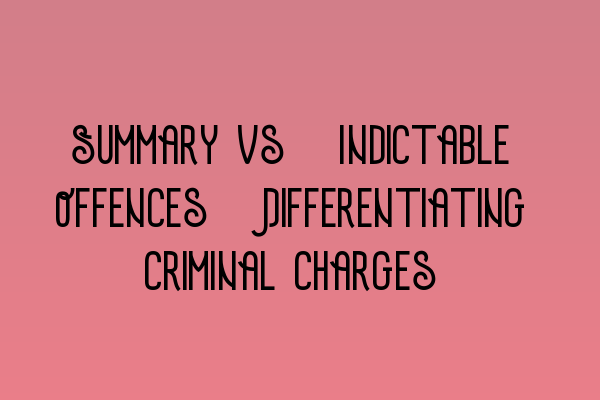Summary vs. Indictable Offences: Differentiating Criminal Charges
When it comes to criminal charges in the UK, there are two main categories: summary offences and indictable offences. Understanding the difference between these two types of charges is essential, as it can significantly impact the way a case is handled and the potential consequences for the accused. In this blog post, we will explore the characteristics of summary and indictable offences, highlighting their distinctions and implications within the criminal justice system.
Summary Offences
A summary offence, also known as a minor offence, is a less serious criminal charge that is typically heard in a magistrates’ court. These types of offences are usually less complex and carry relatively minor penalties compared to indictable offences.
Examples of summary offences include petty theft, public disorder offences, and driving offenses such as speeding or driving without insurance. These crimes are generally considered less severe and are therefore more likely to be dealt with by magistrates rather than being escalated to a higher court.
Magistrates’ courts are responsible for handling summary offences as part of their caseload. These courts consist of lay magistrates, who are usually volunteers with no formal legal training, and a legally qualified magistrate known as a District Judge. The decisions made in magistrates’ courts are typically final for summary offences, although some cases may be eligible for appeal to a higher court.
If found guilty of a summary offence, the potential penalties can vary depending on the severity of the crime. These penalties can include fines, community orders, or imprisonment for a limited period of up to six months. However, it is crucial to note that the maximum sentencing for any single summary offence cannot exceed six months in imprisonment or a fine that exceeds the statutory maximum.
It’s important to seek legal advice if you find yourself facing a summary offence charge. An experienced criminal solicitor can provide guidance, representation, and ensure that your rights are protected throughout the legal process.
Indictable Offences
Indictable offences, on the other hand, are more serious criminal charges that are typically heard in the Crown Court. These offences often involve complex legal issues and carry more severe penalties compared to summary offences.
Examples of indictable offences include murder, rape, robbery, serious fraud, and drug trafficking. These crimes are considered more grave and are therefore subject to higher levels of scrutiny and investigation.
Indictable offences start in the magistrates’ court, where a preliminary hearing takes place. During this hearing, the accused is informed of the charges against them, and the case is reviewed to determine if it should be dealt with in the Crown Court. If the magistrates’ court decides that the case is too serious, it is transferred to the Crown Court for a trial.
In the Crown Court, the case is heard by a judge and a jury. The accused has the option to plead guilty or not guilty, and the trial proceeds accordingly. If found guilty, the sentencing for indictable offences can range from significant fines to life imprisonment, depending on the nature and severity of the crime committed.
Legal representation is crucial for those facing indictable offences, as the complexities of these cases require skilled advocacy to navigate the legal process effectively. A criminal solicitor experienced in handling serious charges can provide valuable advice, build a robust defense strategy, and help protect your rights throughout the entire legal proceedings.
Conclusion
In summary, summary offences are less serious criminal charges that are typically heard in magistrates’ courts, while indictable offences are more severe charges that are usually dealt with in the Crown Court. The distinction between these two types of offences is essential in understanding the potential consequences and procedures involved in a criminal case.
If you are preparing to pursue a career in criminal law or need more information about preparing for the SQE (Solicitors Qualifying Examination) exams, consider exploring our related articles:
- SQE 1 Practice Exam Questions
- SQE 1 Practice Mocks FLK1 FLK2
- SQE 2 Preparation Courses
- SQE 1 Preparation Courses
- SRA SQE Exam Dates
At SQE Criminal Law & Practice Law UK, we provide comprehensive resources and training for aspiring solicitors. Our courses and practice materials are designed to help you succeed in your legal career. Whether you are interested in criminal law or any other area of legal practice, our expert team is here to support your journey.
